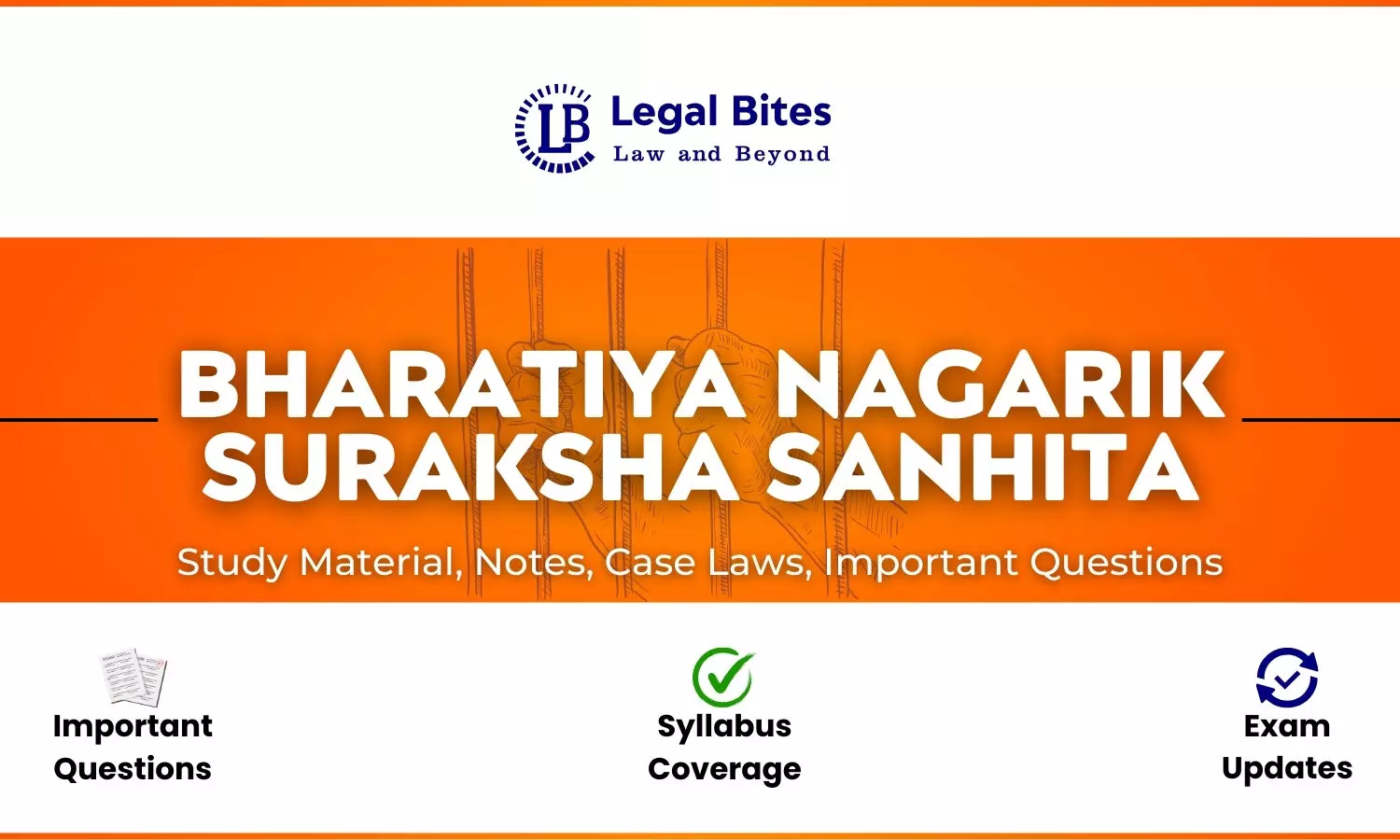Bharatiya Nagarik Suraksha Sanhita (BNSS) - Notes, Case Laws And Study Material
The Bharatiya Nagarik Suraksha Sanhita, 2023 (BNSS) replaced the Criminal Procedure Code, 1973 (CrPC). Legal Bites provides comprehensive Bharatiya Nagarik Suraksha Sanhita study materials for students and lawyers

The Bharatiya Nagarik Suraksha Sanhita, 2023 (BNSS) replaced the Criminal Procedure Code, 1973 (CrPC). Legal Bites provides comprehensive Bharatiya Nagarik Suraksha Sanhita study materials for students and lawyers to deepen their understanding of the subject. The series covers important topics and case studies and offers valuable insights for those seeking to improve their knowledge. Legal Bites is committed to providing quality and insightful study materials.
Bharatiya Nagarik Suraksha Sanhita - Notes, Case Laws And Study Material
(Topics to be updated Soon)
Module I
- Bharatiya Nagarik Suraksha Sanhita 2023 PDF
- FAQs on the Bharatiya Nagarik Suraksha Sanhita, 2023
- Overview of Bharatiya Nagarik Suraksha Sanhita
- A Comparative Study Between Bharatiya Nagarik Suraksha Sanhita and the CrPC (Code of Criminal Procedure)
- Frozen Salary Account During Cyber-Crime Probe: 2025 Allahabad High Court Perspective
- Antecedents and Allegations in Court: When Do They Matter?
- When is an Arrest Invalidated for Non-Compliance with Article 22(1)?
- Can Exceptional Circumstances Justify Quashing a Rape Case?
- Does Section 438 BNSS Permit a Complainant to File Revision Against a Summoning Order?
- Can Criminal Courts Review Judgments Beyond Clerical or Arithmetical Errors?
- Can a Magistrate Direct the Police to Register an FIR When a Complaint Discloses a Cognizable Offence?
Module II
- Arrest: Bharatiya Nagarik Suraksha Sanhita, 2023
- Rights of an Arrested Person
- Consequences of non-compliance with provisions of the arrest
- Police Search Powers under Bharatiya Nagarik Suraksha Sanhita, 2023
Module III
- Maintenance under BNSS
- Maintenance Claim Fails When Husband’s Inability to Earn Stems from Wife’s Family’s Criminal Conduct
- Does Custody of One Child Relieve a Husband from Paying Maintenance?
- Earning Wife Still Entitled to Maintenance if Income Insufficient, Clarifies Kerala High Court
- Is a Mother Entitled to Maintenance From Her Children Despite Having a Supporting Husband?
- Wife’s Right to Maintenance Stands Independent of Voidable Marriage: Allahabad HC
Men Cannot Escape Responsibility of Maintenance: Madras HC on Duty to Wife and Mother
- Can a Divorced Woman Claim Maintenance in India?
- Can Ad-Interim Maintenance Be Granted Without a Formal Application?
- Can an Unmarried Major Christian Daughter Claim Maintenance from Her Father?
- Is the Father Entitled to Get Back Overpaid Maintenance Once the Children Grow Up?
Module IV
- FIR – Meaning and Procedure after recording the FIR
- In FIR Quashing Petitions, Courts Must Not Assess Veracity of Allegations: Supreme Court
- Can an FIR in Cyber Fraud Cases Be Quashed Merely Because the Parties Have Reached a Settlement?
- When Can a Second FIR Be Filed? Supreme Court’s Stand
- Can a High Court Quash an FIR and Investigation Using Section 528 of the Bharatiya Nagarik Suraksha Sanhita?
- Evidentiary value of FIR, statements made to police and Magistrates
- Power of Judicial Magistrate to record confessions/statements
- Procedure to follow on completion of an investigation
- Provision Related to Enquiry and Investigation of Cases of Unnatural Death
Module V
- Power of Courts Under the Bharatiya Nagarik Suraksha Sanhita (BNSS), 2023
- Constitution of Criminal Courts and its Hierarchy
Module VI
- Meaning and Purpose of Complaint. Difference between an FIR and a Complaint
- Issue of Process and Examination of the Complainant
Module VII
- Meaning, Form and Content of Charge
- Charges Once Framed Stand: Interpretation of Section 216 CrPC / Section 239 BNSS
- Is It Legally Permissible to Produce Additional Evidence Post-Chargesheet?
- Meaning and Purpose Trial and Difference between Inquiry and Trial
- Trial Procedure for Warrant Cases
- Trial of Summons Cases before a Magistrate
- “A Shocking Lapse”: Madras High Court on 12-Year Delay in Serving Summons
- Summary Trials
Module VIII
Module IX
- Necessity Test Holds Key Role in Bail Decisions
- Can a High Court Enhance Sentence in an Appeal Filed by the Accused?
- Bail Cannot Be Challenged by Outsiders in Unconnected Case, Holds Allahabad HC
- Can Bail Be Granted Solely on Parity Without Examining the Accused’s Individual Role?
- Mandatory Bail and Discretionary Bail
- Guidelines and Procedure for grant of Bail
- Powers of High Court & Sessions Court in granting bail
- Anticipatory Bail – Meaning and Procedure
- Provisions regarding bond of accused and sureties
Module X
- Once Signed and Pronounced, a Criminal Judgment Becomes Unalterable
- Judgment and Post-Conviction Orders
- Grounds and Procedure of Appeal
- Cases where Appeal is not allowed
Module XI
- Reference and Revisionary Powers of the Sessions Court and High Court
- Powers of the Supreme Court, High Court and Sessions Court to transfer Cases and Appeals
- Inherent Powers of the High Court
Important Case Laws
1) Muhammad Jamil v. State of Haryana (2025) | Bail under BNSS
Your valuable feedback in the form of comments or any desired inputs are encouraged and always welcome. Every contribution toward a goal is valuable, regardless of how small it may be.
Next Story
